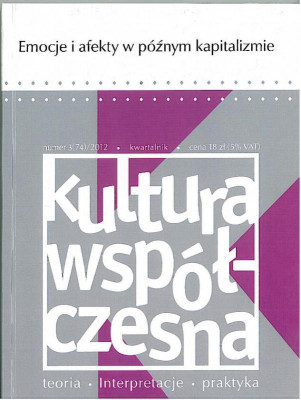Settings and search
Emotions in late capitalism


Table of contents
I EMOTIONS IN LATE CAPITALISM
Agata Dembek, Mateusz Halawa, Marek Krajewski
Emotions in late capitalism. Introduction
Conversation with Eva Illouz
The “I” labour
Eva Illouz
The great transformation of love or the emergence of marriage markets
Agata Dembek
Professionalization of emotions at home and at work – selected problematizations of emotions in contemporary capitalism
Marta Bucholc
World families as a laboratory of self-restraint. Control of family love in global capitalism according to Ulrich Beck and Elisabeth-Beck-Gemsheim in light of Norbert Elias’ theory
Małgorzata Jacyno
From feminisation to hybridisation of the subject
Michael Hardt
Affective labor
Artur Szarecki
Committed employee: emotional control and colonization of the working body in corporate culture
Marek Krajewski
Car – a machine to format emotions
Rafał Drozdowski
Is the capitalistic hell paved with emotions? Reflection upon the “Balcerowicz’s clock”
Paweł Dobrosielski, Marcin Napiórkowski
Collecting screw tops. Bad conscience in late capitalism
Alicja Raciniewska
Ethical fashion. Paradoxes of the new trend
Marta Zimniak-Hałajko
The structure of new optimism. “Personnel development” at the University of Warsaw
II ANTHROPOLOGICAL WORKSHOPS
Marek Hendrykowski
Animation as document. Document as animation. On the poetics and anthropology of moving images
III CULTURAL OBSERVATORY
Błażej Popławski
Polish Development School – the forgotten paradigm of studies of the Global South transformation
IV REVIEWS
Dawid Kolasa
The “cold intimacy” of emotions and market
Maja Sawicka
Everyone of us is Emma Bovary, or why love hurts
Ariel Modrzyk
“The Century of the Self” and “The Trap” by Adam Curtis,or the history of two servants of social engineering – psychoanalysis and rational choice theory
Przemysław Pluciński
The identity traps of new capitalism
Monika Rosińska
The schizophrenic affect
Jacek Zwierzyński
Between the power discourse and the pleasure principle
Magdalena Kempna-Pieniążek
The philosophy of common denominator
Piotr Cichocki
The politics of access, the aesthetics of citation. Reflections on the “Circulations of Culture” report
V IN MEMORY OF JERZY KMITA
Krzysztof Kostyrko
Jerzy Kmita passed away (1931–2012)
Andrzej Szahaj
Master
Emotions in late capitalism
Emotions in late capitalism. Introduction
- Agata Dembek, Mateusz Halawa, Marek Krajewski
Conversation with Eva Illouz, The “I” labour
- Agata Dembek, Mateusz Halawa
The great transformation of love or the emergence of marriage markets
- Eva Illouz
The article analyses the role and significance of emotions in contemporary Western culture. The author argues that the dominant position of the new middle class ethos and of the psychological expertise in the symbolic field transformed emotions into basic tools of communication and influence. Gradual economization and psychologization of the language in which the social reality is described has resulted in objectivization and rationalization of experiencing and expressing emotions. Thus, moral categories have been replaced by emotional ones, which now serve to judge attitude and conduct of individuals both in the public sphere and in the professional environment.
Sociology of emotions is dominated by an approach that perceives economic life and its organisational forms as enforcing a standard of control of emotions in the market sphere which is inadequate to the character of relations in the non-economic sphere. However, the division into market and non-market contexts of emotions management fails to take into account the homogeneity of the standards of emotions control in late capitalism. The article discusses the processes of emotions control in capitalism in light of Norbert Elias’ theory. The analysis of emotional work in the new forms of family life (“world families”, Weltfamilien) by Ulrich Beck and Gerlinde Gernsheim-Beck serves as an illustration of this phenomenon.
The diagnosis of feminisation of the subject (and similar ones, e. g. of detraditionalization) in its early formulations related to challenging the patriarchate. It was also understood as a reorientation of the civilisation process: the autarchic male subject was to be replaced by relational subjectivity, attributed to women. However, the contemporary problematizations of this diagnosis note that the revalorization of the dispositions associated with the feminine habitus – relationality, emotionality, dialogical attitude – in the public sphere and in the job market lost (or maybe never possessed) its subversive character. Debates on this issue concentrate on the mechanisms of reproduction of inequalities (remasculinization), which should ultimately result in hybridisation of the subject. The article relates the problems of feminization and hybridisation of the subject to other equally intense contemporary discussions connected with the issue of disappearance of social transcendence. Treating the social sphere as unobvious and searching for society in “traces” and “symptoms” leads the author to reflect upon the historical contexts of perceiving the social sphere as something eternal, granted and self-evident. Modernity was founded on the basis of a “magical” opposition between the social and the economic, which can be understood as “redundant” towards the masculinity-femininity dichotomy. Dedifferentiation of the social and the economic, as well as the masculine and the feminine, harmonizes with the relational subject project, which is currently promoted. The author demonstrates that hybridisation of the subject becomes a mode of privatising macrostructure.
Affective labor
- Michael Hardt
The author utilizes Michel Foucault’s theories to analyse the development of management knowledge, which generates specific practices of disciplining the working body. The emergence of “organizational culture” discourse, viewed from the anthropological perspective, provides new tools for interfering with the emotions of employees. Not only behaviour and appearance is regulated, but also “internalized” mental states and forms of their physical expressions.
A car is a medium that not only connects us with the world, but also creates the world. Specific features of a car (as a machine, a material object and representation) enforce certain relations with individuals and thus impose specific affective states. Therefore, they provoke actions which are the results of such relations. However, the relation-forming and emotion-formatting features of a car are themselves results of complex relations, which led to the development of a car as vehicle, to the creation of an independent car culture and to its transformation into a mean of production of the modern world.
The example of the “Balcerowicz’s clock” reminds us that while “emotional resources” of capitalist society can be multiplied infinitely, the same cannot be said about its institutional and manufacturing resources, as well as real reinforcements that could be awarded to its members. In other words, in capitalist society (and capitalism itself) emotions can significantly enhance productivity and vitality. However, another scenario is also possible – the overproduction of emotions, which cannot be inscribed into any existing institutional frames and thus cannot be “positively developed”, as they refer to unrealizable “here and now” (or even “somewhere else and later”) aspirations and claims.
The authors prove that collecting plastic screw tops for charity – a widespread practice among contemporary Polish society – is a phenomenon that is based on self-contradictory economical and ecological rationalization. Such practices of collecting pieces of rubbish for charity also have a well established history as social myths and urban legends. The authors utilize psychoanalytic theories to argue that this phenomenon is an acting out of remorse for the consumptionist lifestyle of the late capitalist society – specifically for the fact that we always live at the expense of others.
Is ethical fashion a solution to one of the fundamental paradoxes of contemporary capitalist societies, namely the creation of individual and collective happiness through increased prosperity and consumption possibilities? The author briefly describes this trend and reflects upon the factors responsible for the popularization of reliable and conscious consumption in fashion. What is more, she interprets its significance and political effectiveness, as well as analyses its potential in the context of creating a lasting emotional satisfaction of consumers.
The author analyses selected training courses, seminars and conferences for research personnel of the University of Warsaw, in which she has taken part in the recent years. These events comprised different topics (cooperation of the university with social environment, protection of intellectual property, modern didactic tools) and can be interpreted as forming a coherent system, which serves as a method of altering the attitudes, practices and motivations of the university personnel. These systemic actions aim at accommodating the research personnel to the requirements of late capitalist economy.
Anthropological workshops
Anca Damian, in her film “Crulic: The Path to Beyond” (2011), connected modern film animation with contemporary documentary convention. Probability – a cognitive category useful in film studies and in analysis of moving images – can be also related to documentary films. It can be applied to both fictional and factual films. The idea of the so-called “slices of life” (“tranches de vie”) was born not in a documentary, but in a fictional film. The daring escape from screen fiction, which we encounter in “Crulic: The Path to Beyond”, is a transition of animated cinema into reality, which is then carefully documented and described with the means of expression of this creative domain.
Cultural observatory
The aim of the article is to describe the Polish Development School – the role of the scientific milieu headed by Michal Kalecki, which conceptualized a new paradigm in development thinking. In the introduction, the institutional framework for the concepts or thought patterns is characterized. Afterwards, intellectual biographies of Michal Kalecki and Oskar Lange, their methodology, as well as their contribution to the development of humanistic sciences are presented. Next, the article shows scale of using the Kaleckian Economics and socio-economic theories of Lange to the description of transformation of the “Third World”. Finally, the paper characterizes compound reasons why Polish thinkers were interested in the Global South and development studies.
Reviews
The “cold intimacy” of emotions and market
- Dawid Kolasa
Eva Illouz, Why Love Hurts: A Sociologial Explanation, Polity Press, Cambridge–Malden 2012.
“The Century of the Self” and “The Trap” by Adam Curtis,or the history of two servants of social engineering – psychoanalysis and rational choice theory
- Ariel Modrzyk
Richard Sennett, Kultura nowego kapitalizmu, przeł. G. Brzozowski, K. Osłowski, Warszawskie Wydawnictwo Literackie MUZA S A, Warszawa 2010.
The schizophrenic affect
- Monika Rosińska
Paweł Leszkowicz, Nagi mężczyzna. Akt męski w sztuce polskiej po 1945 roku, Wydawnictwo Naukowe UAM, Poznań 2012.
Noël Carroll, Filozofia sztuki masowej, przeł. Mirosław Przylipiak, słowo/obraz terytoria, Gdańsk 2011.
Mirosław Filiciak, Justyna Hofmokl, Alek Tarkowski, Obiegi kultury. Społeczna cyrkulacja treści, Warszawa 2012.
